University Leadership and Development: MBTI Test Report Analysis
VerifiedAdded on 2020/03/04
|8
|1784
|87
Report
AI Summary
This report presents an analysis of a Myers-Briggs Type Indicator (MBTI) test, focusing on the author's personality traits and their implications for leadership. The report details the author's scores in various categories, including introversion/extroversion, sensing/intuition, feeling/thinking, and judging/perceiving, and provides a self-assessment of how these traits manifest in their behavior and decision-making processes. The author reflects on the test results, agreeing with some aspects while questioning others. Furthermore, the report provides an overview of the MBTI test itself, discussing its purpose, methodology, and common criticisms. It highlights the test's use in professional settings and addresses debates regarding its validity and scientific basis, including concerns about its division of people into sixteen groups and the lack of professional training of its inventors. The report concludes by emphasizing the importance of considering both the strengths and weaknesses of the MBTI when using it for personality assessment, particularly in the context of leadership development.
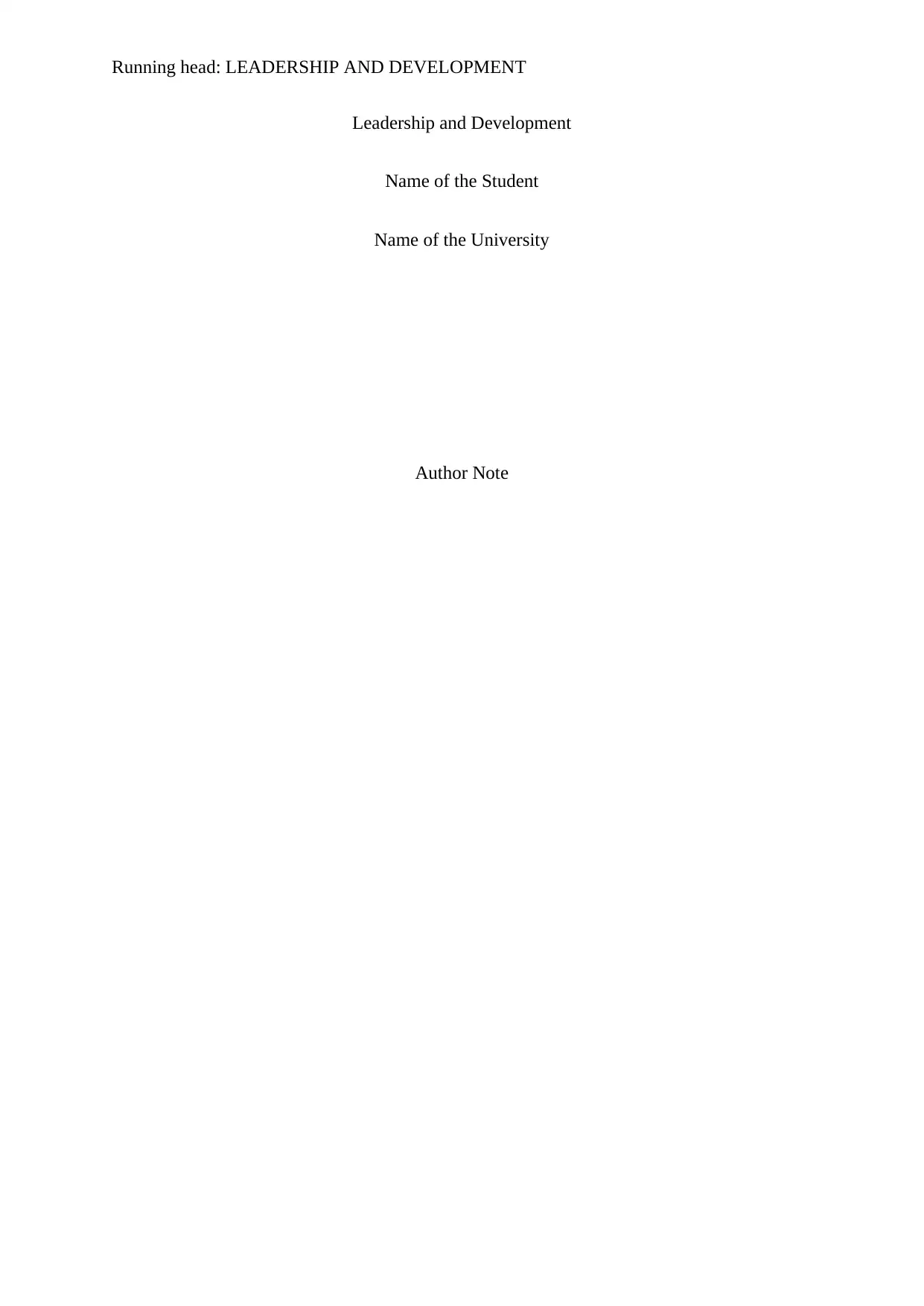
Running head: LEADERSHIP AND DEVELOPMENT
Leadership and Development
Name of the Student
Name of the University
Author Note
Leadership and Development
Name of the Student
Name of the University
Author Note
Paraphrase This Document
Need a fresh take? Get an instant paraphrase of this document with our AI Paraphraser
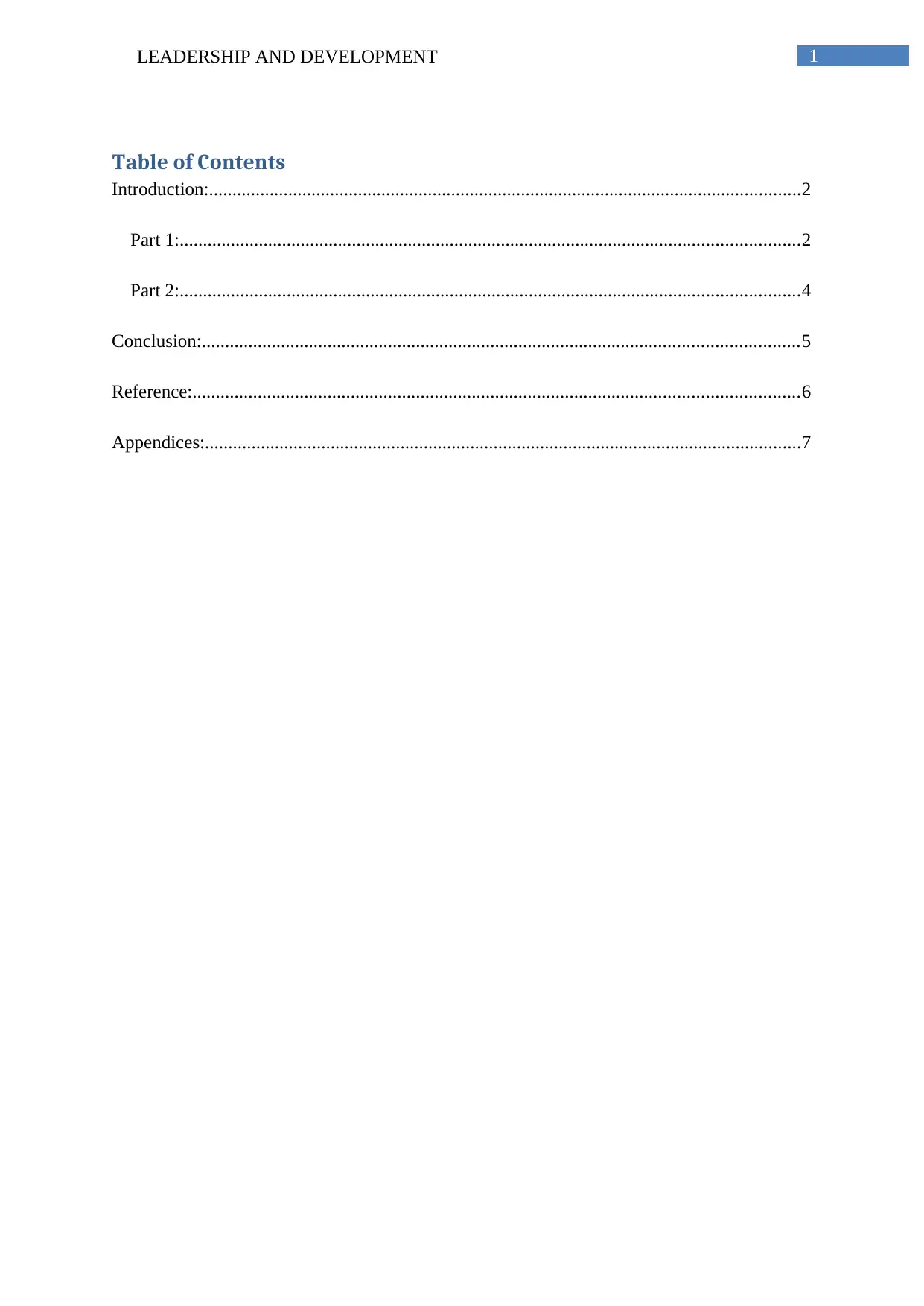
1LEADERSHIP AND DEVELOPMENT
Table of Contents
Introduction:...............................................................................................................................2
Part 1:.....................................................................................................................................2
Part 2:.....................................................................................................................................4
Conclusion:................................................................................................................................5
Reference:..................................................................................................................................6
Appendices:................................................................................................................................7
Table of Contents
Introduction:...............................................................................................................................2
Part 1:.....................................................................................................................................2
Part 2:.....................................................................................................................................4
Conclusion:................................................................................................................................5
Reference:..................................................................................................................................6
Appendices:................................................................................................................................7
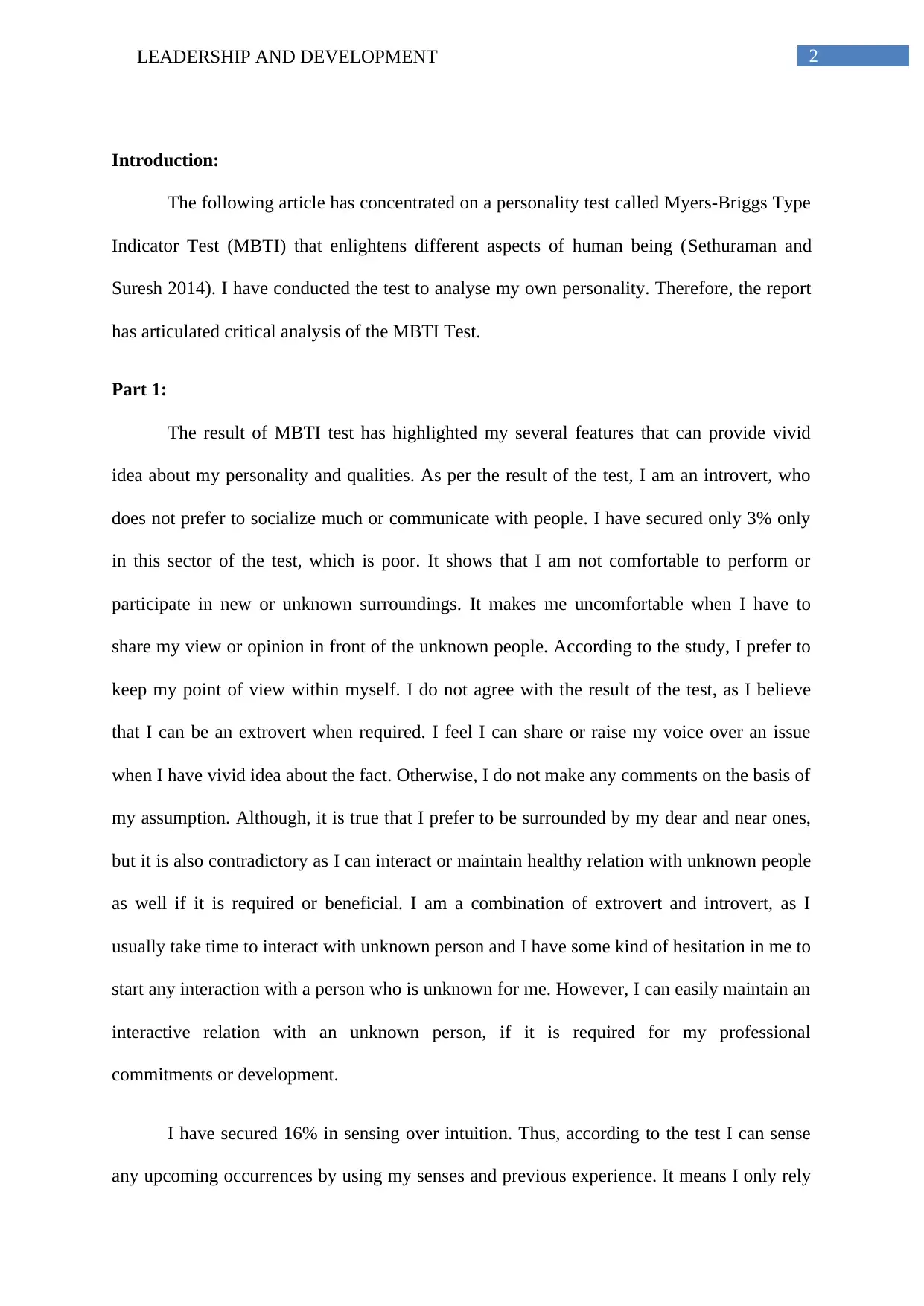
2LEADERSHIP AND DEVELOPMENT
Introduction:
The following article has concentrated on a personality test called Myers-Briggs Type
Indicator Test (MBTI) that enlightens different aspects of human being (Sethuraman and
Suresh 2014). I have conducted the test to analyse my own personality. Therefore, the report
has articulated critical analysis of the MBTI Test.
Part 1:
The result of MBTI test has highlighted my several features that can provide vivid
idea about my personality and qualities. As per the result of the test, I am an introvert, who
does not prefer to socialize much or communicate with people. I have secured only 3% only
in this sector of the test, which is poor. It shows that I am not comfortable to perform or
participate in new or unknown surroundings. It makes me uncomfortable when I have to
share my view or opinion in front of the unknown people. According to the study, I prefer to
keep my point of view within myself. I do not agree with the result of the test, as I believe
that I can be an extrovert when required. I feel I can share or raise my voice over an issue
when I have vivid idea about the fact. Otherwise, I do not make any comments on the basis of
my assumption. Although, it is true that I prefer to be surrounded by my dear and near ones,
but it is also contradictory as I can interact or maintain healthy relation with unknown people
as well if it is required or beneficial. I am a combination of extrovert and introvert, as I
usually take time to interact with unknown person and I have some kind of hesitation in me to
start any interaction with a person who is unknown for me. However, I can easily maintain an
interactive relation with an unknown person, if it is required for my professional
commitments or development.
I have secured 16% in sensing over intuition. Thus, according to the test I can sense
any upcoming occurrences by using my senses and previous experience. It means I only rely
Introduction:
The following article has concentrated on a personality test called Myers-Briggs Type
Indicator Test (MBTI) that enlightens different aspects of human being (Sethuraman and
Suresh 2014). I have conducted the test to analyse my own personality. Therefore, the report
has articulated critical analysis of the MBTI Test.
Part 1:
The result of MBTI test has highlighted my several features that can provide vivid
idea about my personality and qualities. As per the result of the test, I am an introvert, who
does not prefer to socialize much or communicate with people. I have secured only 3% only
in this sector of the test, which is poor. It shows that I am not comfortable to perform or
participate in new or unknown surroundings. It makes me uncomfortable when I have to
share my view or opinion in front of the unknown people. According to the study, I prefer to
keep my point of view within myself. I do not agree with the result of the test, as I believe
that I can be an extrovert when required. I feel I can share or raise my voice over an issue
when I have vivid idea about the fact. Otherwise, I do not make any comments on the basis of
my assumption. Although, it is true that I prefer to be surrounded by my dear and near ones,
but it is also contradictory as I can interact or maintain healthy relation with unknown people
as well if it is required or beneficial. I am a combination of extrovert and introvert, as I
usually take time to interact with unknown person and I have some kind of hesitation in me to
start any interaction with a person who is unknown for me. However, I can easily maintain an
interactive relation with an unknown person, if it is required for my professional
commitments or development.
I have secured 16% in sensing over intuition. Thus, according to the test I can sense
any upcoming occurrences by using my senses and previous experience. It means I only rely
⊘ This is a preview!⊘
Do you want full access?
Subscribe today to unlock all pages.

Trusted by 1+ million students worldwide
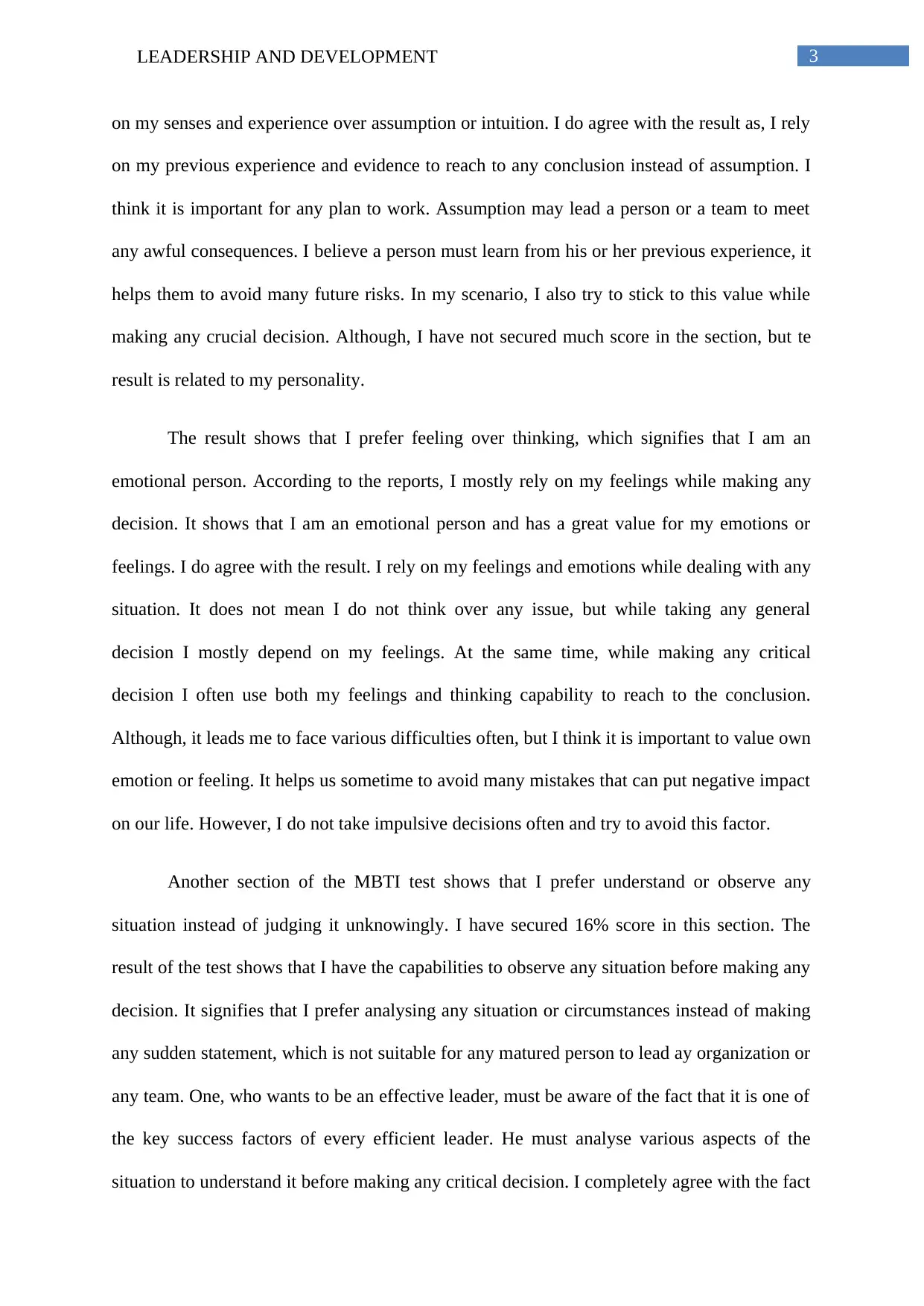
3LEADERSHIP AND DEVELOPMENT
on my senses and experience over assumption or intuition. I do agree with the result as, I rely
on my previous experience and evidence to reach to any conclusion instead of assumption. I
think it is important for any plan to work. Assumption may lead a person or a team to meet
any awful consequences. I believe a person must learn from his or her previous experience, it
helps them to avoid many future risks. In my scenario, I also try to stick to this value while
making any crucial decision. Although, I have not secured much score in the section, but te
result is related to my personality.
The result shows that I prefer feeling over thinking, which signifies that I am an
emotional person. According to the reports, I mostly rely on my feelings while making any
decision. It shows that I am an emotional person and has a great value for my emotions or
feelings. I do agree with the result. I rely on my feelings and emotions while dealing with any
situation. It does not mean I do not think over any issue, but while taking any general
decision I mostly depend on my feelings. At the same time, while making any critical
decision I often use both my feelings and thinking capability to reach to the conclusion.
Although, it leads me to face various difficulties often, but I think it is important to value own
emotion or feeling. It helps us sometime to avoid many mistakes that can put negative impact
on our life. However, I do not take impulsive decisions often and try to avoid this factor.
Another section of the MBTI test shows that I prefer understand or observe any
situation instead of judging it unknowingly. I have secured 16% score in this section. The
result of the test shows that I have the capabilities to observe any situation before making any
decision. It signifies that I prefer analysing any situation or circumstances instead of making
any sudden statement, which is not suitable for any matured person to lead ay organization or
any team. One, who wants to be an effective leader, must be aware of the fact that it is one of
the key success factors of every efficient leader. He must analyse various aspects of the
situation to understand it before making any critical decision. I completely agree with the fact
on my senses and experience over assumption or intuition. I do agree with the result as, I rely
on my previous experience and evidence to reach to any conclusion instead of assumption. I
think it is important for any plan to work. Assumption may lead a person or a team to meet
any awful consequences. I believe a person must learn from his or her previous experience, it
helps them to avoid many future risks. In my scenario, I also try to stick to this value while
making any crucial decision. Although, I have not secured much score in the section, but te
result is related to my personality.
The result shows that I prefer feeling over thinking, which signifies that I am an
emotional person. According to the reports, I mostly rely on my feelings while making any
decision. It shows that I am an emotional person and has a great value for my emotions or
feelings. I do agree with the result. I rely on my feelings and emotions while dealing with any
situation. It does not mean I do not think over any issue, but while taking any general
decision I mostly depend on my feelings. At the same time, while making any critical
decision I often use both my feelings and thinking capability to reach to the conclusion.
Although, it leads me to face various difficulties often, but I think it is important to value own
emotion or feeling. It helps us sometime to avoid many mistakes that can put negative impact
on our life. However, I do not take impulsive decisions often and try to avoid this factor.
Another section of the MBTI test shows that I prefer understand or observe any
situation instead of judging it unknowingly. I have secured 16% score in this section. The
result of the test shows that I have the capabilities to observe any situation before making any
decision. It signifies that I prefer analysing any situation or circumstances instead of making
any sudden statement, which is not suitable for any matured person to lead ay organization or
any team. One, who wants to be an effective leader, must be aware of the fact that it is one of
the key success factors of every efficient leader. He must analyse various aspects of the
situation to understand it before making any critical decision. I completely agree with the fact
Paraphrase This Document
Need a fresh take? Get an instant paraphrase of this document with our AI Paraphraser
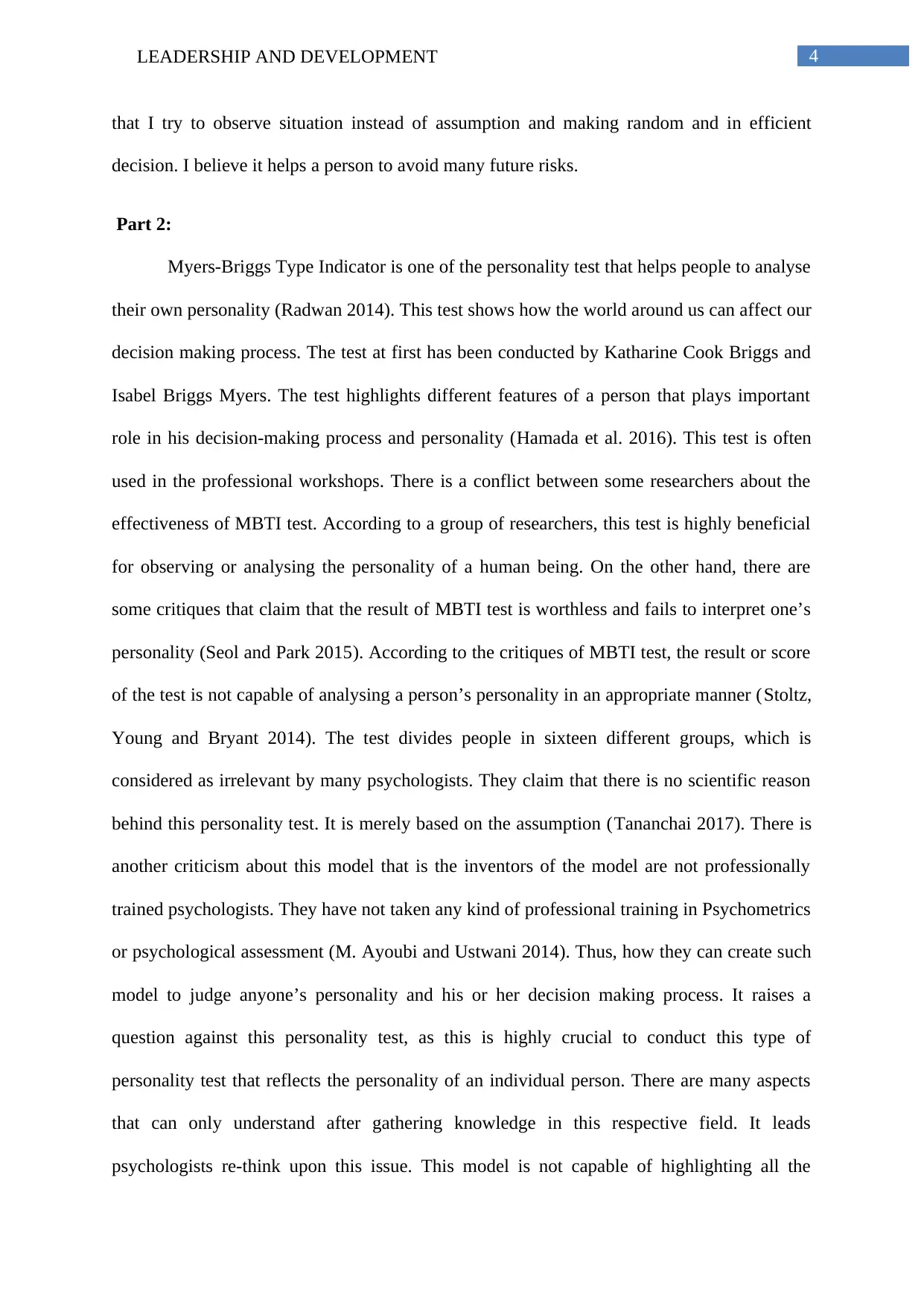
4LEADERSHIP AND DEVELOPMENT
that I try to observe situation instead of assumption and making random and in efficient
decision. I believe it helps a person to avoid many future risks.
Part 2:
Myers-Briggs Type Indicator is one of the personality test that helps people to analyse
their own personality (Radwan 2014). This test shows how the world around us can affect our
decision making process. The test at first has been conducted by Katharine Cook Briggs and
Isabel Briggs Myers. The test highlights different features of a person that plays important
role in his decision-making process and personality (Hamada et al. 2016). This test is often
used in the professional workshops. There is a conflict between some researchers about the
effectiveness of MBTI test. According to a group of researchers, this test is highly beneficial
for observing or analysing the personality of a human being. On the other hand, there are
some critiques that claim that the result of MBTI test is worthless and fails to interpret one’s
personality (Seol and Park 2015). According to the critiques of MBTI test, the result or score
of the test is not capable of analysing a person’s personality in an appropriate manner (Stoltz,
Young and Bryant 2014). The test divides people in sixteen different groups, which is
considered as irrelevant by many psychologists. They claim that there is no scientific reason
behind this personality test. It is merely based on the assumption (Tananchai 2017). There is
another criticism about this model that is the inventors of the model are not professionally
trained psychologists. They have not taken any kind of professional training in Psychometrics
or psychological assessment (M. Ayoubi and Ustwani 2014). Thus, how they can create such
model to judge anyone’s personality and his or her decision making process. It raises a
question against this personality test, as this is highly crucial to conduct this type of
personality test that reflects the personality of an individual person. There are many aspects
that can only understand after gathering knowledge in this respective field. It leads
psychologists re-think upon this issue. This model is not capable of highlighting all the
that I try to observe situation instead of assumption and making random and in efficient
decision. I believe it helps a person to avoid many future risks.
Part 2:
Myers-Briggs Type Indicator is one of the personality test that helps people to analyse
their own personality (Radwan 2014). This test shows how the world around us can affect our
decision making process. The test at first has been conducted by Katharine Cook Briggs and
Isabel Briggs Myers. The test highlights different features of a person that plays important
role in his decision-making process and personality (Hamada et al. 2016). This test is often
used in the professional workshops. There is a conflict between some researchers about the
effectiveness of MBTI test. According to a group of researchers, this test is highly beneficial
for observing or analysing the personality of a human being. On the other hand, there are
some critiques that claim that the result of MBTI test is worthless and fails to interpret one’s
personality (Seol and Park 2015). According to the critiques of MBTI test, the result or score
of the test is not capable of analysing a person’s personality in an appropriate manner (Stoltz,
Young and Bryant 2014). The test divides people in sixteen different groups, which is
considered as irrelevant by many psychologists. They claim that there is no scientific reason
behind this personality test. It is merely based on the assumption (Tananchai 2017). There is
another criticism about this model that is the inventors of the model are not professionally
trained psychologists. They have not taken any kind of professional training in Psychometrics
or psychological assessment (M. Ayoubi and Ustwani 2014). Thus, how they can create such
model to judge anyone’s personality and his or her decision making process. It raises a
question against this personality test, as this is highly crucial to conduct this type of
personality test that reflects the personality of an individual person. There are many aspects
that can only understand after gathering knowledge in this respective field. It leads
psychologists re-think upon this issue. This model is not capable of highlighting all the
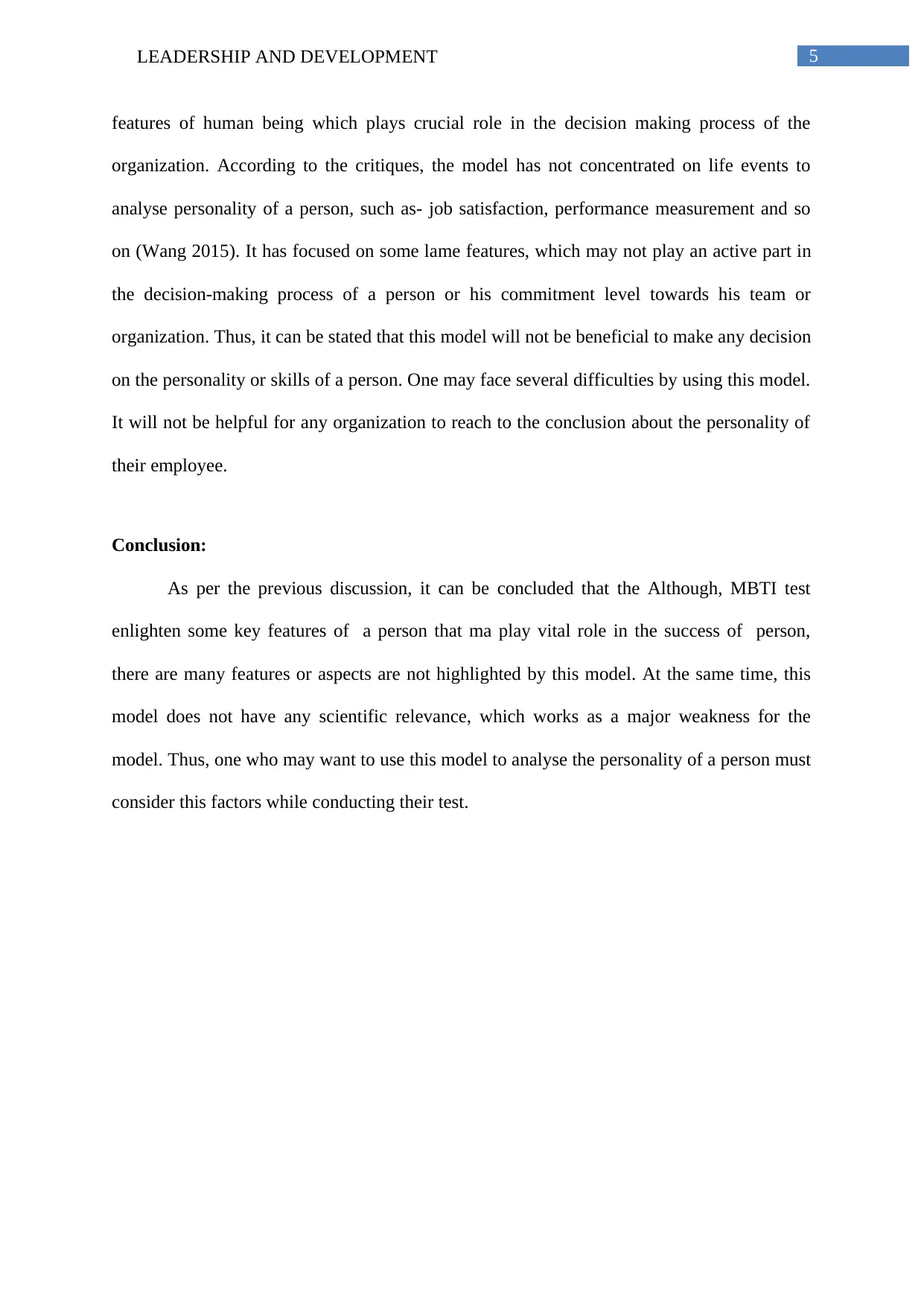
5LEADERSHIP AND DEVELOPMENT
features of human being which plays crucial role in the decision making process of the
organization. According to the critiques, the model has not concentrated on life events to
analyse personality of a person, such as- job satisfaction, performance measurement and so
on (Wang 2015). It has focused on some lame features, which may not play an active part in
the decision-making process of a person or his commitment level towards his team or
organization. Thus, it can be stated that this model will not be beneficial to make any decision
on the personality or skills of a person. One may face several difficulties by using this model.
It will not be helpful for any organization to reach to the conclusion about the personality of
their employee.
Conclusion:
As per the previous discussion, it can be concluded that the Although, MBTI test
enlighten some key features of a person that ma play vital role in the success of person,
there are many features or aspects are not highlighted by this model. At the same time, this
model does not have any scientific relevance, which works as a major weakness for the
model. Thus, one who may want to use this model to analyse the personality of a person must
consider this factors while conducting their test.
features of human being which plays crucial role in the decision making process of the
organization. According to the critiques, the model has not concentrated on life events to
analyse personality of a person, such as- job satisfaction, performance measurement and so
on (Wang 2015). It has focused on some lame features, which may not play an active part in
the decision-making process of a person or his commitment level towards his team or
organization. Thus, it can be stated that this model will not be beneficial to make any decision
on the personality or skills of a person. One may face several difficulties by using this model.
It will not be helpful for any organization to reach to the conclusion about the personality of
their employee.
Conclusion:
As per the previous discussion, it can be concluded that the Although, MBTI test
enlighten some key features of a person that ma play vital role in the success of person,
there are many features or aspects are not highlighted by this model. At the same time, this
model does not have any scientific relevance, which works as a major weakness for the
model. Thus, one who may want to use this model to analyse the personality of a person must
consider this factors while conducting their test.
⊘ This is a preview!⊘
Do you want full access?
Subscribe today to unlock all pages.

Trusted by 1+ million students worldwide
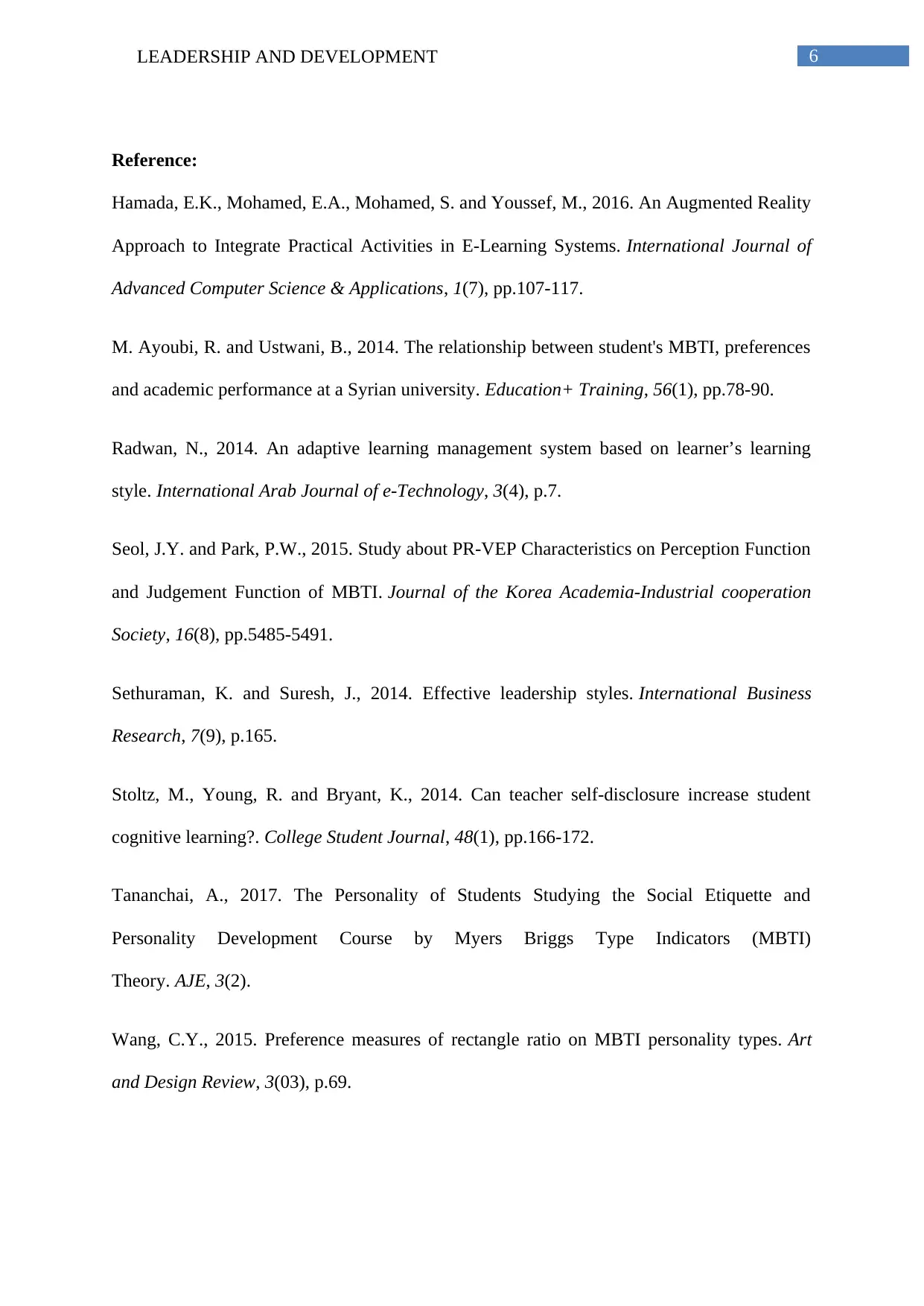
6LEADERSHIP AND DEVELOPMENT
Reference:
Hamada, E.K., Mohamed, E.A., Mohamed, S. and Youssef, M., 2016. An Augmented Reality
Approach to Integrate Practical Activities in E-Learning Systems. International Journal of
Advanced Computer Science & Applications, 1(7), pp.107-117.
M. Ayoubi, R. and Ustwani, B., 2014. The relationship between student's MBTI, preferences
and academic performance at a Syrian university. Education+ Training, 56(1), pp.78-90.
Radwan, N., 2014. An adaptive learning management system based on learner’s learning
style. International Arab Journal of e-Technology, 3(4), p.7.
Seol, J.Y. and Park, P.W., 2015. Study about PR-VEP Characteristics on Perception Function
and Judgement Function of MBTI. Journal of the Korea Academia-Industrial cooperation
Society, 16(8), pp.5485-5491.
Sethuraman, K. and Suresh, J., 2014. Effective leadership styles. International Business
Research, 7(9), p.165.
Stoltz, M., Young, R. and Bryant, K., 2014. Can teacher self-disclosure increase student
cognitive learning?. College Student Journal, 48(1), pp.166-172.
Tananchai, A., 2017. The Personality of Students Studying the Social Etiquette and
Personality Development Course by Myers Briggs Type Indicators (MBTI)
Theory. AJE, 3(2).
Wang, C.Y., 2015. Preference measures of rectangle ratio on MBTI personality types. Art
and Design Review, 3(03), p.69.
Reference:
Hamada, E.K., Mohamed, E.A., Mohamed, S. and Youssef, M., 2016. An Augmented Reality
Approach to Integrate Practical Activities in E-Learning Systems. International Journal of
Advanced Computer Science & Applications, 1(7), pp.107-117.
M. Ayoubi, R. and Ustwani, B., 2014. The relationship between student's MBTI, preferences
and academic performance at a Syrian university. Education+ Training, 56(1), pp.78-90.
Radwan, N., 2014. An adaptive learning management system based on learner’s learning
style. International Arab Journal of e-Technology, 3(4), p.7.
Seol, J.Y. and Park, P.W., 2015. Study about PR-VEP Characteristics on Perception Function
and Judgement Function of MBTI. Journal of the Korea Academia-Industrial cooperation
Society, 16(8), pp.5485-5491.
Sethuraman, K. and Suresh, J., 2014. Effective leadership styles. International Business
Research, 7(9), p.165.
Stoltz, M., Young, R. and Bryant, K., 2014. Can teacher self-disclosure increase student
cognitive learning?. College Student Journal, 48(1), pp.166-172.
Tananchai, A., 2017. The Personality of Students Studying the Social Etiquette and
Personality Development Course by Myers Briggs Type Indicators (MBTI)
Theory. AJE, 3(2).
Wang, C.Y., 2015. Preference measures of rectangle ratio on MBTI personality types. Art
and Design Review, 3(03), p.69.
Paraphrase This Document
Need a fresh take? Get an instant paraphrase of this document with our AI Paraphraser
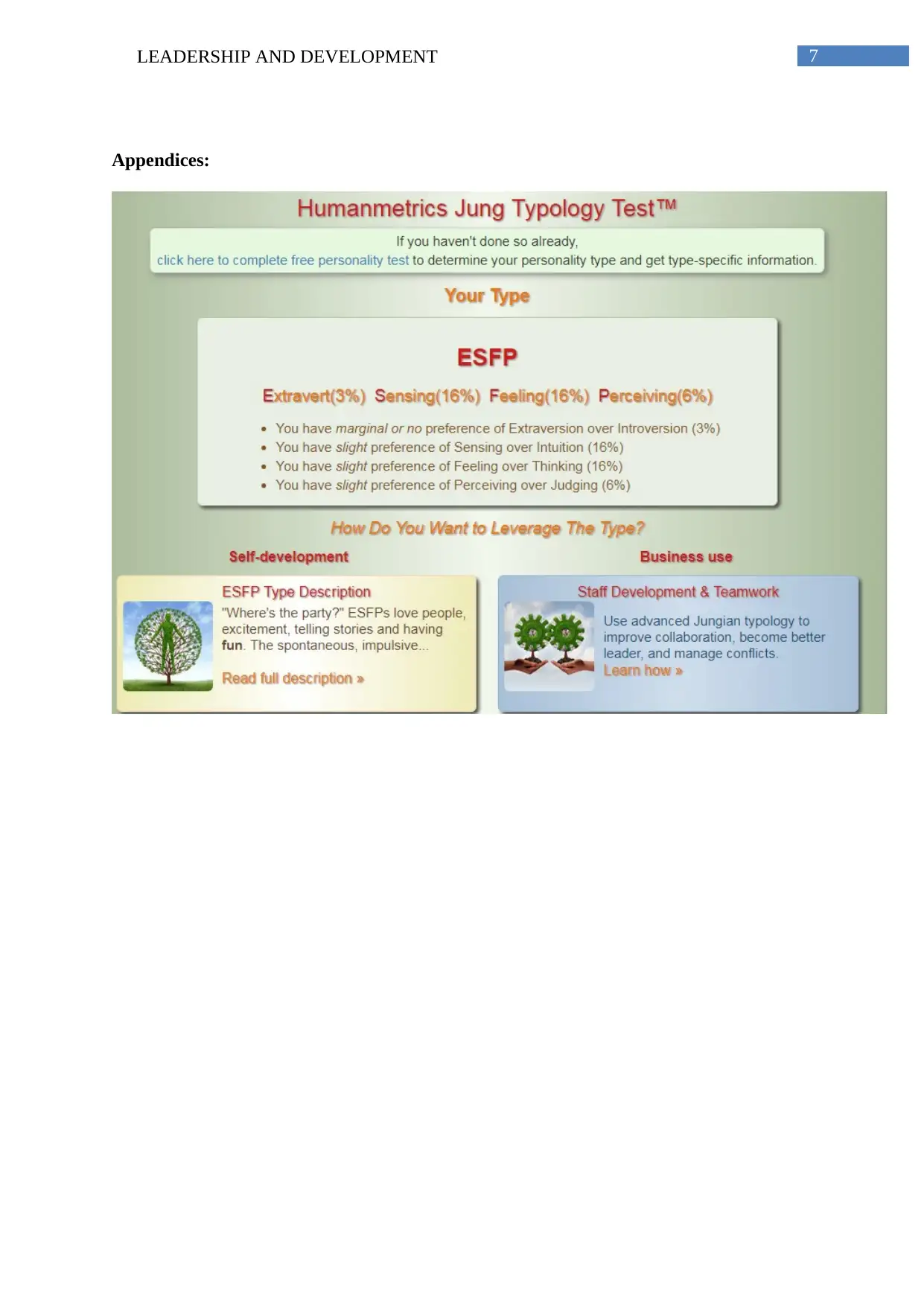
7LEADERSHIP AND DEVELOPMENT
Appendices:
Appendices:
1 out of 8
Related Documents
Your All-in-One AI-Powered Toolkit for Academic Success.
+13062052269
info@desklib.com
Available 24*7 on WhatsApp / Email
![[object Object]](/_next/static/media/star-bottom.7253800d.svg)
Unlock your academic potential
Copyright © 2020–2026 A2Z Services. All Rights Reserved. Developed and managed by ZUCOL.





